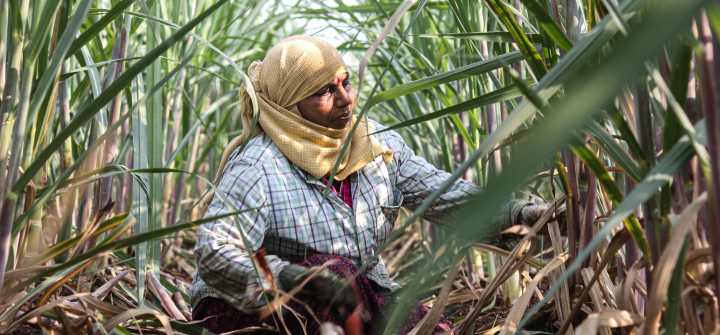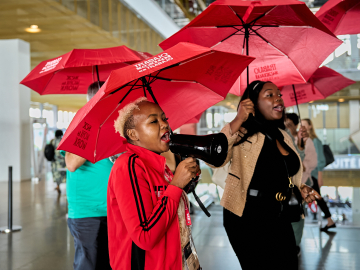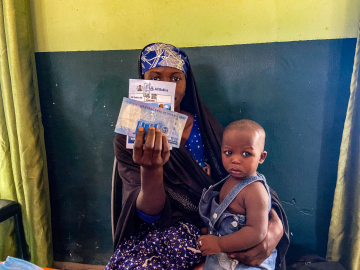Is Climate Change Making Menopause Symptoms More Severe in India?
KURUNDVAD, India—After working in the field for six hours in heat that topped 40 degrees Celsius (104° F), farmworker Sunita Nikam could not sleep.
That had never happened to her before.
Her sleep problems started after she turned 39. Night sweats often woke her. During the day, she started experiencing hot flashes that reddened her face and drenched her in sweat.
She was experiencing symptoms of menopause, which begins between ages 45 and 55.
Nikam, a resident of Kurundvad town in India’s Maharashtra state, tried to ignore it and kept working. Hot flashes and night sweats left her fatigued. Sometimes, she would collapse while working in the sugarcane and soybean fields. She suffered unbearable body aches, and painkillers would bring only temporary relief.
“During that time, it felt like I would die of the pain and restlessness,” recalls Nikam.
After two years of painful days and nights, Nikam realized that working in extreme heat was impacting her menopause transition.
After meeting 10 other women facing similar difficulties, she realized she wasn’t alone. By 2025, 1.1. billion women globally will be perimenopausal, according to a 2014 article in Menopause: The Journal of The North American Menopause Society.
But the hot flashes and night sweats, like those Nikam experienced, might be worsened by fluctuations in average and extreme temperatures caused by climate change, according to a 2023 article in the journal Maturitas. The authors note that an increase in average and extreme temperatures can make hot flashes and night sweats more severe.
Climate change can also lead to a range of mental health symptoms for menopausal women from mild stress to anxiety and depression, making the transition more difficult. Air pollution can lead to cardio-metabolic, cognitive, and bone health problems, which affect the menopausal transition as well.
However, no data yet link climate change and hot flashes, says Sarah Carter, PhD, a researcher with the Heat and Health Research Incubator at the University of Sydney. “But in our data from laboratory trials and interviews, we’ve seen that hot flushes occurring in hotter environments are more uncomfortable,” Carter says.
Vanita Singh, PhD, professor of economics and public policy at the Management Development Institute, notes that no data set in India links climate change and the severity of menopausal symptoms. Singh adds that existing research on menopause in India is sporadic, with limited nationwide studies. “Most of the research is restricted to the age at which women experience menopause, but managing the symptoms remains largely ignored,” she says.
Nikam, now 48, says that her periods stopped five years after facing her first hot flash. “But I face problems with hot flashes and night sweats even today,” she says.
Whenever she visited a public doctor in her village, he would advise her to take medicines for a few days. Ultimately, she would endure seven years with no major relief.

Farmworker Sunita Patil has found it difficult to continue working in the fields because of hot flashes and night sweats that drain her energy. Sanket Jain
A Multitude of Challenges
Savitri Sonawane* from Maharashtra’s Kolhapur district began sensing something was wrong when she suddenly started getting irritated quickly. For the past two years, the 39-year-old resident of Arjunwad village has experienced irregular periods that caused her much more pain than normal. Eventually, she reached premature menopause.
Data on women in low- and middle-income countries, especially in sub-Saharan Africa and South/Southeast Asia, have revealed an increasing prevalence of early and premature menopause, according to a 2023 BMJ Global Health article. In India, the country’s 2019–2021 National Family Health Survey found that nearly 7% of Indian women between the ages of 35 and 39 reported experiencing menopause.
For Sonawane, early menopause has coincided with a rapid deterioration in her health. Women experiencing premature menopause are at risk of neurological diseases, infertility, premature death, mood disorders, osteoporosis, and other conditions, per a 2013 Annals of Medical and Health Science Research.
The barrage of extreme weather events exacts an additional toll on the health of women farmers and farmworkers like Sonawane. Her village has suffered recurring floods, heat waves, hailstorms, drought, and rapid changes in the rainfall pattern. For farmers, these events mean frequent losses that make it difficult to employ farmworkers like Sonawane. The lack of regular work has meant she can’t afford nutritious food and relies on the free ration she gets every month as part of the government’s food security program.
“However, this ration doesn’t provide them enough nutrition, further weakening them,” says community health care worker Shubhangi Kamble.
Almost weekly, Sonawane falls ill because of the climatic changes, adding to her stress. “I just can’t adapt,” she says.
Along with stress, Kamble has noticed many women reporting excessive bleeding during the perimenopause stage. The pain this causes, she says, has led more women to opt for hysterectomy, a surgery that removes the uterus and stops menstruation. The leading self-reported reasons for hysterectomy included menstrual bleeding and pain, per a 2023 Women’s Midlife Health article.
Further, India’s NFHS report points out that 3% of women in India aged 15–49 have had a hysterectomy, with the median age being 34.6.
Singh suggests subsidizing treatment options for menopausal problems like excessive bleeding. “At present, the only option available to poor women is hysterectomy. Thus, we see a surge in hysterectomy with increased government-sponsored health insurance coverage,” Singh says. “Given the long-term adverse effects of hysterectomy on women's health, specifically at a younger age, it must be the last treatment option. However, in India, it is the primary resort for poor women.”
Scarce Solutions
Sonawane, however, never sought help. “In rural areas, talking about periods and menopause is a taboo,” she says. “The only solution is to bear the pain and never seek help.”
To help menopausal women, Singh advocates for establishing dedicated clinics that would meet their needs. And Ollie Jay, professor of Heat and Health at the University of Sydney, urges individuals to take measures like wetting the skin, taking rest breaks in the shade, and scheduling work hours for cooler parts of the day. Meanwhile, the authors of the 2023 Maturitas article take a much higher-level view. They call for reductions in greenhouse gas emissions, changes in dietary habits, and the promotion of other “behavioral measures that reduce anthropogenic climate change and at the same time have a beneficial role on several domains of physical and psychological wellbeing.”
However, farmers like Nikam say that there are no safety regulations that can save them from working in the heat waves or extreme weather events. They have little choice: To eat, they must work, no matter how severe the heat gets.
Nikam, taking a break from work, says her trips to the doctor every couple of weeks yielded no relief and little comfort. She shared her plight, but almost all of it went unheard.
“No one is interested in how menopause affects a woman,” says Nikam. “I was relieved only after my menopause ended.”
* Name changed to protect source’s privacy.
Sanket Jain is a journalist, documentary photographer, and a Senior People’s Archive of Rural India and Earth Journalism Network fellow based in Western India’s Maharashtra state.
Ed. Note: This article is part of Global Health NOW’s Local Reporting Initiative, made possible through the generous support of loyal GHN readers.
Join the 50,000+ subscribers in over 170 countries who rely on Global Health NOW summaries and exclusive articles for the latest public health news. Sign up for our free weekday newsletter, and please share the link with friends and colleagues.
India’s heat waves have made menopause symptoms more severe for farmworker Sunita Nikam in Kurundvad, India. Sanket Jain




